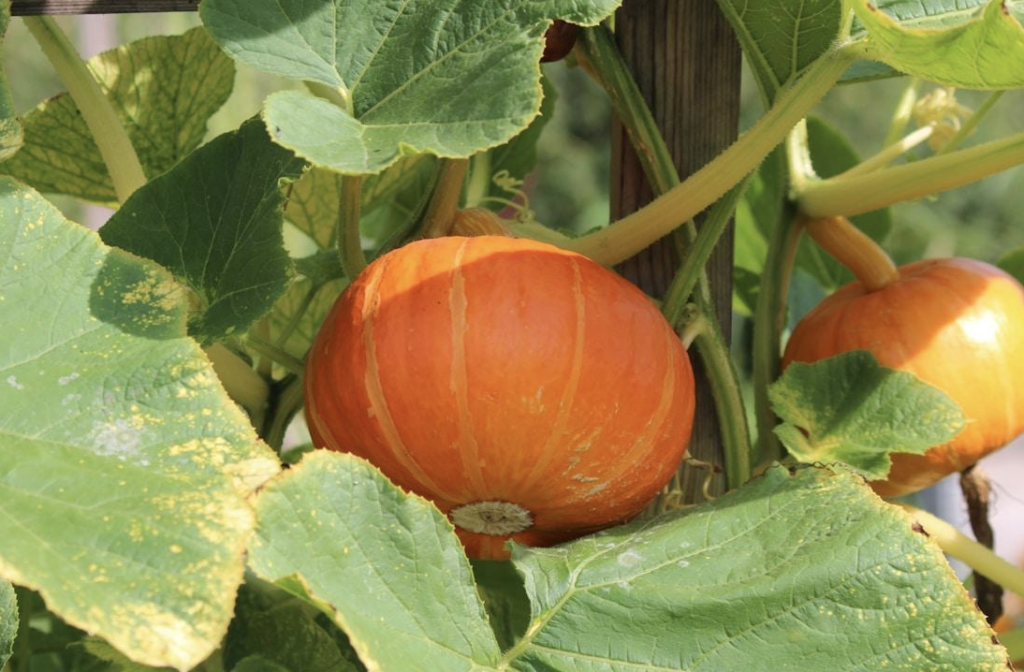And How One Neighbor Grew a Pumpkin Patch That Stopped Traffic

Denver’s growing season is short, but with some planning and smart techniques, you can enjoy homegrown vegetables all summer—even the trickier ones like pumpkins, melons, and cantaloupes.
Last fall, I was walking through my neighborhood when I came across something that made me stop in my tracks: a spectacular pumpkin patch spilling out of a small front yard. The pumpkins were enormous, some of the biggest I’ve ever seen, and there were so many that the homeowner had set up hay bales and decorations so neighbors could stop and take photos. Of course, I had to chat with her.
When I asked how she managed to grow such a bumper crop in such a small space, she smiled and said, “It’s my gardener. He puts mulch on the pumpkins. He’s the one who gets them to grow so big.”
That conversation stuck with me. In a place like Denver, where the window between the last spring frost and the first fall frost is pretty narrow, gardeners have to be thoughtful and proactive. Here are some of the best tips I’ve gathered from neighbors, local experts, and personal experience for growing healthy, abundant vegetables in our climate.
1. Start Seeds Indoors
If you’re hoping for pumpkins, melons, or cantaloupes, don’t wait for the warm weather to start. Begin your seeds indoors in late March or early April. These longer-season crops need a head start.
Use seed trays with grow lights or heat mats to simulate spring warmth. Plan to transplant your seedlings around mid to late May, once the danger of frost has passed. I like to use non-GMO seeds from places like True Leaf Market.
2. Warm the Soil Before Transplanting
Melons and pumpkins thrive in warm soil, but Denver’s springtime ground can take its time warming up. You can cover your garden beds with black or clear plastic sheeting a couple of weeks before planting to help raise the temperature and retain heat overnight.
After planting, consider leaving the plastic in place as mulch or switching to straw or compost.
3. Mulch for Moisture and Growth
My neighbor’s secret weapon was mulch. It doesn’t just help the pumpkins grow big, it also keeps moisture in the soil and protects fruit from direct contact with the dirt, which helps prevent rot and blemishes.
For crops like pumpkins, melons, and cantaloupes, straw or shredded leaves work well. As the fruit grows, slide a little straw underneath each one to lift it slightly off the ground.
4. Water Deeply and Consistently
These plants need regular water to thrive. Shallow watering can cause small fruit or cracked rinds. Try using drip irrigation or soaker hoses to deliver water directly to the roots, and water early in the morning when it’s cooler.
Aim for one to two inches of water each week, increasing during hot spells.
5. Feed the Soil
If you want large pumpkins and flavorful melons, the health of your soil is key. Healthy, nutrient-rich soil supports strong vines and better fruit.
Before you plant:
- Add as much organic compost as you can. It improves structure and provides a steady release of nutrients.
- Consider mixing in well-aged manure or a balanced organic fertilizer high in nitrogen to support early vine growth.
- Add bone meal or rock phosphate to encourage strong roots and more flowers.
Mid-season care:
- Once your plants are growing well, reduce nitrogen and switch to a fertilizer higher in phosphorus and potassium to promote flowering and fruit development.
- Supplement with compost tea, fish emulsion, or seaweed extract every couple of weeks. These feed the soil microbes and help with nutrient absorption.
- A mid-season layer of worm castings or additional compost can give your plants a helpful second wind.
In the off-season, consider planting a cover crop like clover or winter rye to build soil health and suppress weeds. When tilled in during spring, these plants become organic matter your vegetables will love.
6. Choose Short-Season Varieties
Not all pumpkins and melons are a good fit for Denver’s short season. Look for varieties that mature in 85 to 95 days or less. Some good choices include:
- Pumpkins: Autumn Gold, Early Giant, Baby Pam
- Watermelon: Sugar Baby, Blacktail Mountain, Golden Midget
- Cantaloupe: Minnesota Midget, Halona, Athena
7. Protect Against Frost
Late spring and early fall frosts can catch even the best gardeners off guard. Keep a few frost blankets or row covers on hand so you’re ready to protect your plants if a cold night sneaks up on you.
Gardening in Denver comes with its challenges, but it can also be incredibly rewarding. Starting early, building healthy soil, and using mulch wisely can make a big difference. Who knows—your yard might be the one that draws attention next fall.
If you have your own tricks for getting big results in a short season, I’d love to hear them. Or if you want help finding a home with room for a backyard garden, I’d be happy to help with that, too.
